湖南省2017年中考英语总复习语法课件:专题12 简单句
文档属性
| 名称 | 湖南省2017年中考英语总复习语法课件:专题12 简单句 |  | |
| 格式 | zip | ||
| 文件大小 | 2.1MB | ||
| 资源类型 | 教案 | ||
| 版本资源 | 通用版 | ||
| 科目 | 英语 | ||
| 更新时间 | 2017-05-26 22:17:55 | ||
图片预览

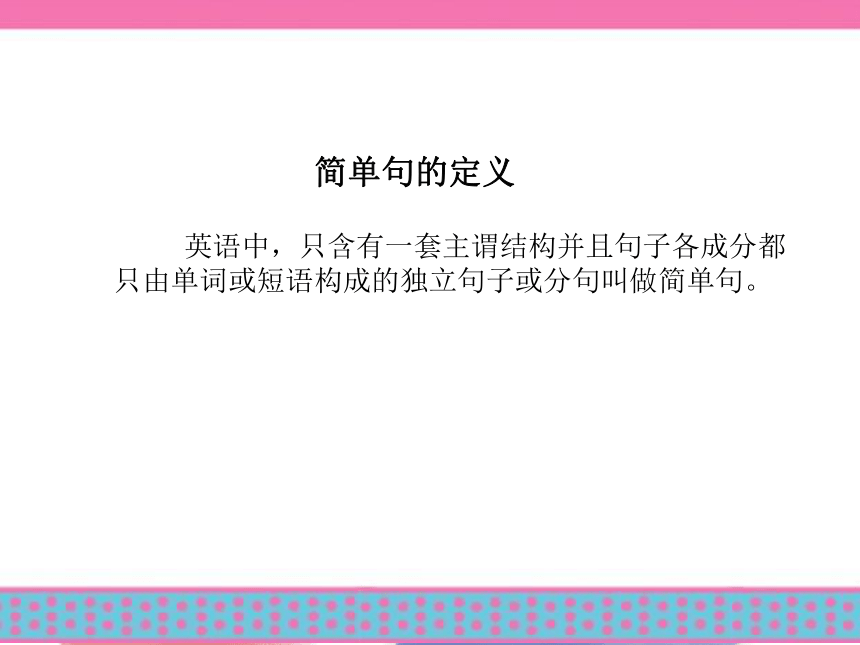
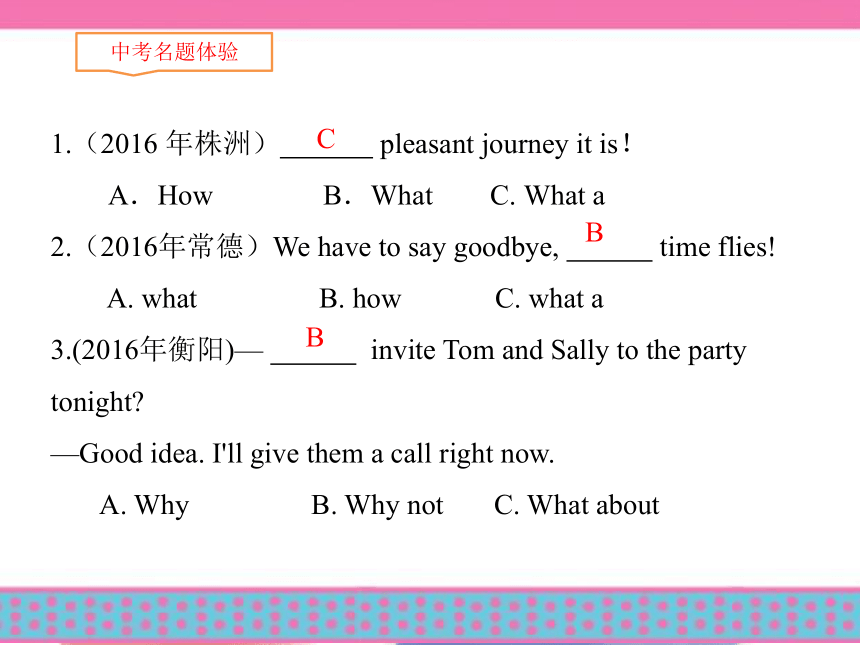
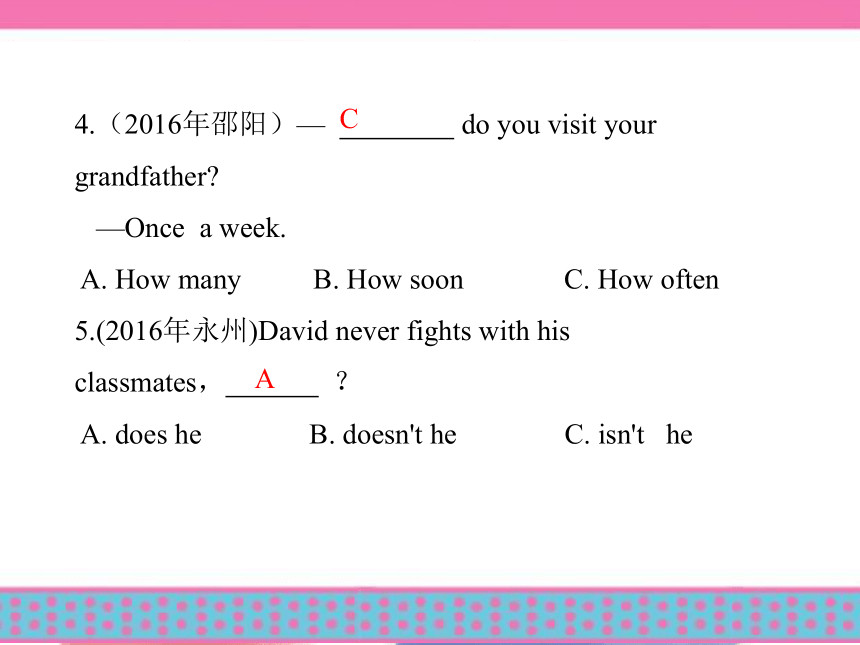
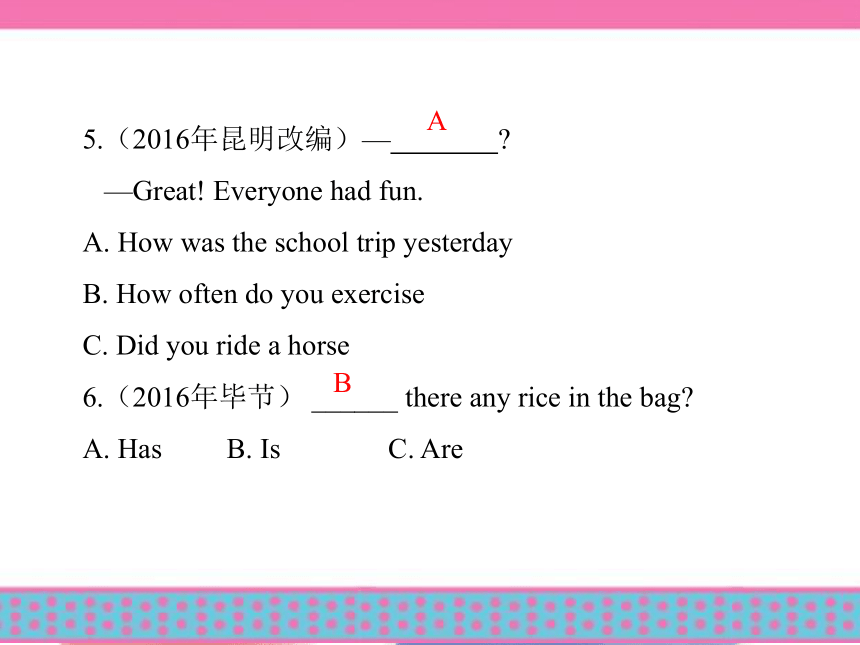

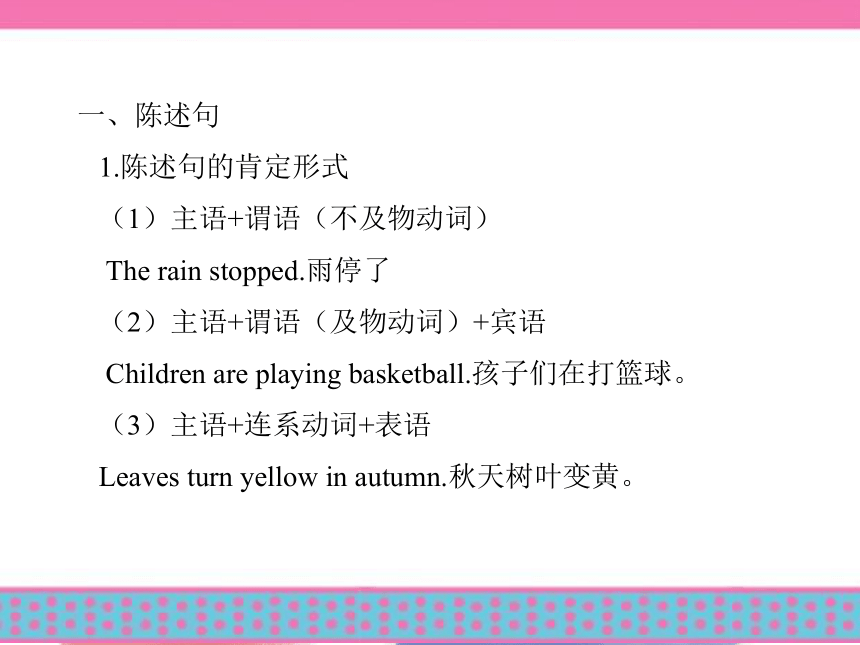
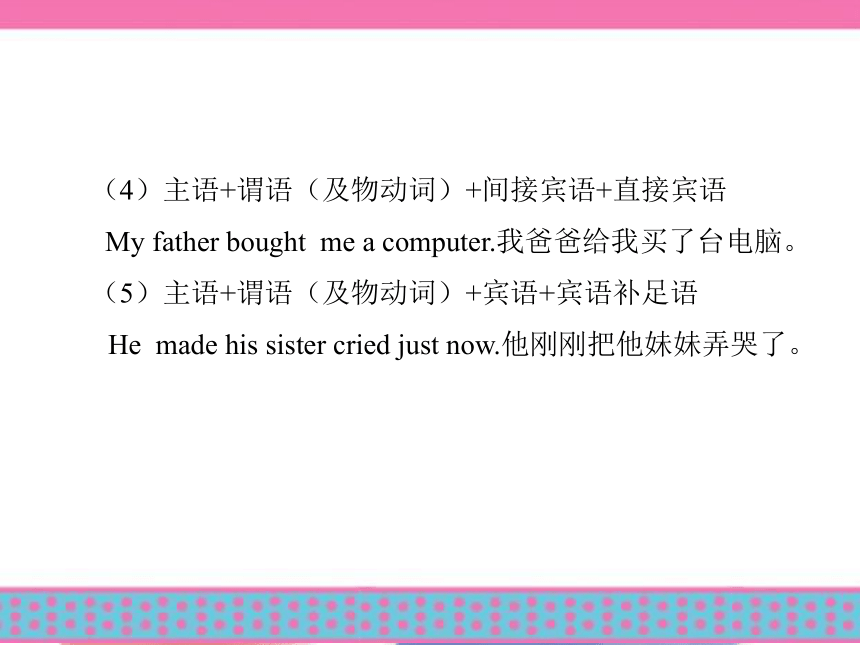
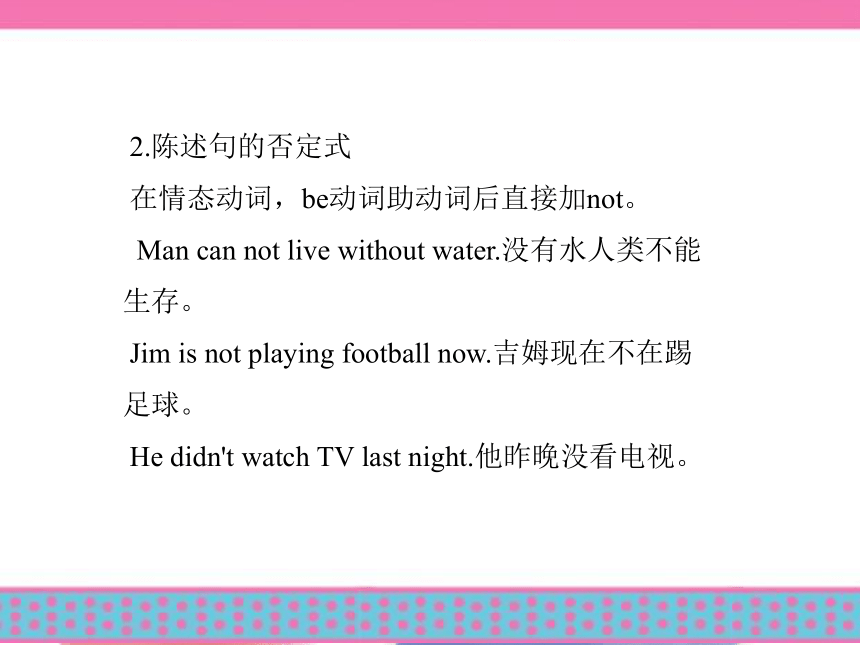
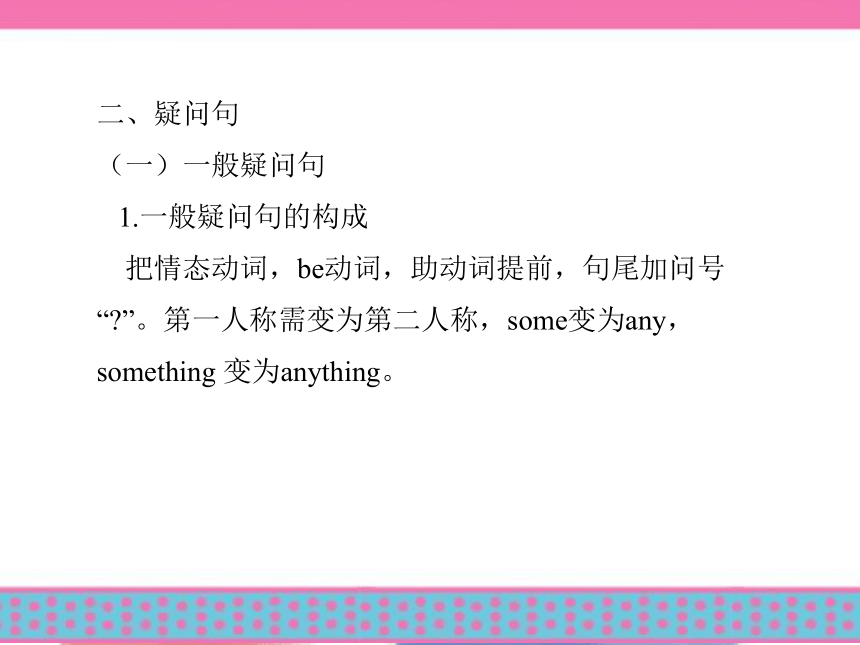
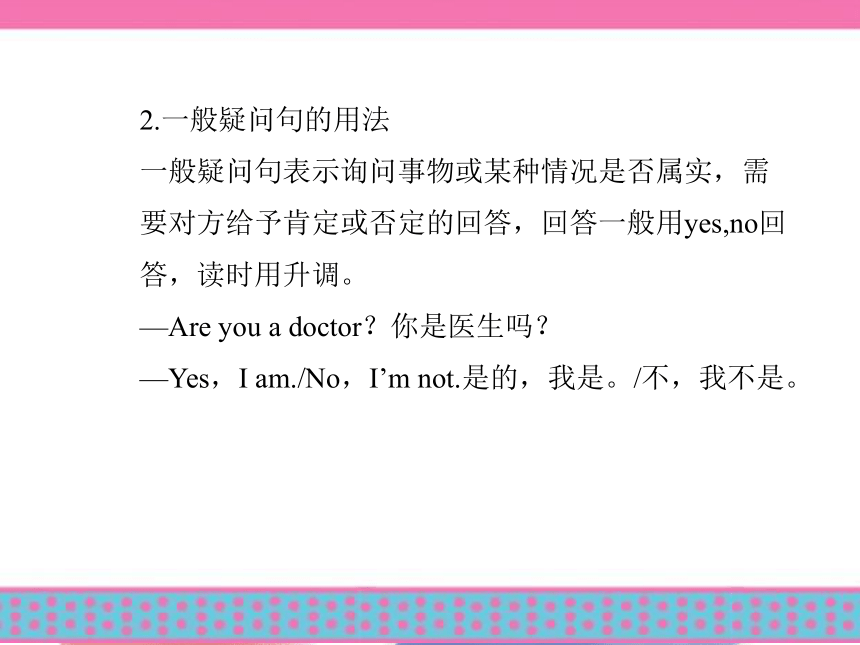
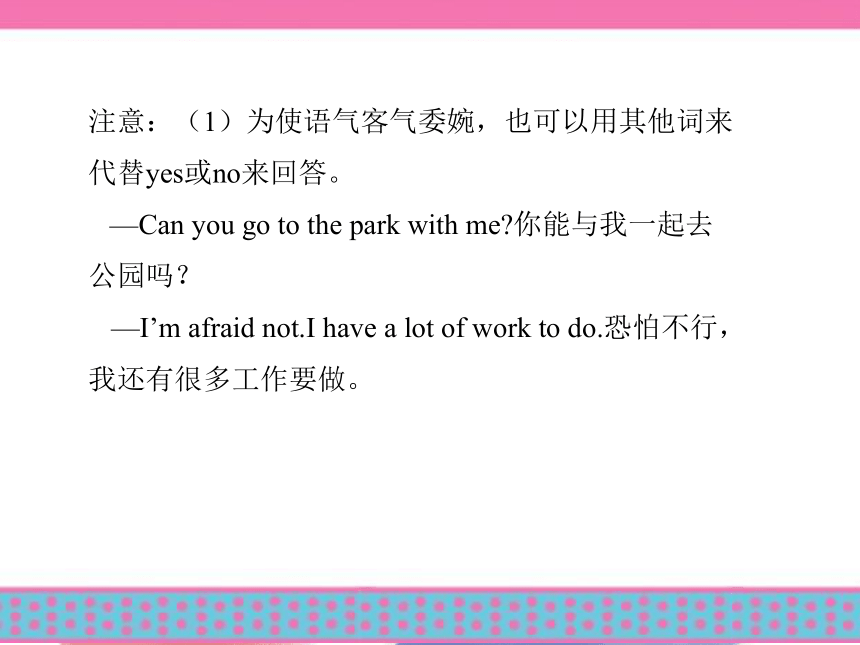
文档简介
课件34张PPT。
英语湖南
专题十二 简单句
英语中,只含有一套主谓结构并且句子各成分都只由单词或短语构成的独立句子或分句叫做简单句。
简单句的定义中考名题体验1.(2016 年株洲) pleasant journey it is!
A.How B.What C. What a
2.(2016年常德)We have to say goodbye, time flies!
A. what B. how C. what a
3.(2016年衡阳)— invite Tom and Sally to the party tonight?
—Good idea. I'll give them a call right now.
A. Why B. Why not C. What aboutCBB4.(2016年邵阳)— do you visit your grandfather?
—Once a week.
A. How many B. How soon C. How often
5.(2016年永州)David never fights with his classmates, ?
A. does he B. doesn't he C. isn't heCA5.(2016年昆明改编)— ?
—Great! Everyone had fun.
A. How was the school trip yesterday
B. How often do you exercise
C. Did you ride a horse
6.(2016年毕节) ______ there any rice in the bag?
A. Has B. Is C. Are AB语法探究一、陈述句
1.陈述句的肯定形式
(1)主语+谓语(不及物动词)
The rain stopped.雨停了
(2)主语+谓语(及物动词)+宾语
Children are playing basketball.孩子们在打篮球。
(3)主语+连系动词+表语
Leaves turn yellow in autumn.秋天树叶变黄。
(4)主语+谓语(及物动词)+间接宾语+直接宾语
My father bought me a computer.我爸爸给我买了台电脑。
(5)主语+谓语(及物动词)+宾语+宾语补足语
He made his sister cried just now.他刚刚把他妹妹弄哭了。
2.陈述句的否定式
在情态动词,be动词助动词后直接加not。
Man can not live without water.没有水人类不能生存。
Jim is not playing football now.吉姆现在不在踢足球。
He didn't watch TV last night.他昨晚没看电视。
二、疑问句
(一)一般疑问句
1.一般疑问句的构成
把情态动词,be动词,助动词提前,句尾加问号“?”。第一人称需变为第二人称,some变为any,something 变为anything。
2.一般疑问句的用法
一般疑问句表示询问事物或某种情况是否属实,需要对方给予肯定或否定的回答,回答一般用yes,no回答,读时用升调。
—Are you a doctor?你是医生吗?
—Yes,I am./No,I’m not.是的,我是。/不,我不是。注意:(1)为使语气客气委婉,也可以用其他词来代替yes或no来回答。
—Can you go to the park with me?你能与我一起去公园吗?
—I’m afraid not.I have a lot of work to do.恐怕不行,我还有很多工作要做。
(2)否定的一般疑问句通常是以be动词、情态动词或助动词加not 的缩略形式开头,往往用于表示惊讶、赞叹、怀疑。否定的一般疑问句的答语yes和no 的汉语翻译与其原意正好相反。
—Don't you hear of that?你没有听说过那件事吗?
—Yes,I do./No,I don't.不,我听说过。/是的,我没有听说过。(二)特殊疑问句
1.特殊疑问句的构成
特殊疑问句一般由“疑问词+一般疑问句?”构成。但当主语是疑问代词who,what,which 或 which作限定词修饰主语时,句子应用陈述语序。
Who likes go to the supermarket with me?谁愿意跟我一起去超市?
Which train leaves for Beijing.哪列火车开往北京?
2.特殊疑问词的用法续表:续表:续表:续表:(三)选择疑问句
要求对方对两种或两种以上的情况进行选择的问句,叫做选择疑问句。选择疑问句的两个供选择的部分之间用or连接。选择疑问句不能用yes 或 no 回答。
一Do you like Tom or Jerry?你喜欢汤姆还是杰瑞?
一I like Jery.我喜欢杰瑞。
—Which do you like best,apples,oranges or bananas?你最喜欢哪一样,苹果、橘子还是香蕉?
—I like apples best.我最喜欢苹果。(四)反意疑问句
反意疑问句由两部分组成,前一部分为陈述句,后一部分为简略的一般疑问句,这两部分在肯定与否定方面相反,即“前肯后否或前否后肯”。反意疑问句的主语和谓语应与陈述部分的主语和谓语保持一致。
You are a student,aren’t you?你是一名学生,对吗?
He works hard,doesn’t he?他学习努力,对吗? 反意疑问句的特殊用法
1.陈述句用“I’m…”结构时,附加反意疑问部分一般用“aren't I”。
I'm late,aren’t I?我迟到了,是吗?
2.陈述句中有little,few,no,never,nothing,nobody,hardly等表示否定意义的词时,附加反意疑问部分用肯定形式。
There is little water in the bottle,is there?瓶子里没多少水了,是吗?
3.陈述句主语为不定代词nothing,something,anything时,附加反意疑问部分的主语用代词it;陈述句主语为不
定代词everyone,no one,someone,everybody,nobody,anybody时,附加反意疑问部分的主语常用代词they,有时也用he 。
Something is wrong with your car,isn’t it?你的车有问题了,是吗? 4.陈述句的主语是指示代词this或that时,附加反意疑问部分的主语用it;陈述句的主语是these或those时,附加反意疑问部分的主语用they。
This is a car,isn’t it?这是一辆小汽车,不是吗?
Those aren’t apples,are they?那些不是苹果,是吗?
5. 陈述句部分如果是“I( don't)think(believe,suppose…)+宾语从句”结构,附加反意疑问部分的主语和谓语动词应与宾语从句中的主语和谓语保持一致。
I don't think he is right,is he?我认为他不对,是吧? 6. 祈使句的反意疑问句
肯定祈使句,+ will you/won't you?
否定祈使句,+ will you?
Let's…,+shall we?(包括对方)
Let us…,+will you?(不包括对方)。
Let's go to the movies,shall we?咱们去看电影,好吗?
Let us go to the movies,will you?让我们去看电影,好吗?
7.感叹句的反意疑问句一律用否定式,并用be动词的一般现在时。
What a lovely girl,isn't she?多可爱的女孩呀,不是吗?
8.there be句型,附加反意疑问部分仍用there。
There won't be any trouble,will there?不会有麻烦,是吗?
(五)祈使句
祈使句表示命令、请求、建议或劝告等。主语通常
被省略,谓语动词用原形,句末用感叹号或句号,读降调。
1. 肯定的祈使句
①以动词原形开头,省略主语。
Come in!进来!
2.有时为了加强语气,可以在动词之前加上do,表示“务必;一定”。
Do come on time!一定要准时来!
2.否定的祈使句
Don’t+动词原形。
Let's+not+ 动 词原形。
Don't be late.不要迟到。
Let's not speak loudly.我们不要大声说话。
(六)感叹句
感叹句就是用来表达喜、怒、哀、乐等强烈感情的句子。感叹句一般以what或how开头,句末加感叹号“!”。what修饰名词,how修饰形容词或副词。
What good students they are!他们是多好的学生啊!
How fast she is running!她跑得多快啊!专项集训1.Jim _____ like to go to the zoo.
A. isn’t B.is C. doesn’t
2. —____ do you read English newspaper?
—I read China Daily every day.
A. How soon B. How long
C. How often
CC3. He has many friends at school, ___ ?
A. has he B. does he C. doesn’t he
4.—______ it is!
?— Let's go out and enjoy the sunshine!
A. What a lovely day??? B. How windy???
C. What a rainy day?? CA5.–Have you read today’s newspaper?
–No. _____ there lots of sports news in it?
A. Are B. Is C. Was
6.— ___ we go to the zoo tomorrow afternoon??
—Good idea.
?A. Are????B. Shall??? C. DoBB7. —____ heavy the rainstorm is!
—Yes, the town has experienced the most serious flood during the past ten years.
A. How B. What C. How a A
英语湖南
专题十二 简单句
英语中,只含有一套主谓结构并且句子各成分都只由单词或短语构成的独立句子或分句叫做简单句。
简单句的定义中考名题体验1.(2016 年株洲) pleasant journey it is!
A.How B.What C. What a
2.(2016年常德)We have to say goodbye, time flies!
A. what B. how C. what a
3.(2016年衡阳)— invite Tom and Sally to the party tonight?
—Good idea. I'll give them a call right now.
A. Why B. Why not C. What aboutCBB4.(2016年邵阳)— do you visit your grandfather?
—Once a week.
A. How many B. How soon C. How often
5.(2016年永州)David never fights with his classmates, ?
A. does he B. doesn't he C. isn't heCA5.(2016年昆明改编)— ?
—Great! Everyone had fun.
A. How was the school trip yesterday
B. How often do you exercise
C. Did you ride a horse
6.(2016年毕节) ______ there any rice in the bag?
A. Has B. Is C. Are AB语法探究一、陈述句
1.陈述句的肯定形式
(1)主语+谓语(不及物动词)
The rain stopped.雨停了
(2)主语+谓语(及物动词)+宾语
Children are playing basketball.孩子们在打篮球。
(3)主语+连系动词+表语
Leaves turn yellow in autumn.秋天树叶变黄。
(4)主语+谓语(及物动词)+间接宾语+直接宾语
My father bought me a computer.我爸爸给我买了台电脑。
(5)主语+谓语(及物动词)+宾语+宾语补足语
He made his sister cried just now.他刚刚把他妹妹弄哭了。
2.陈述句的否定式
在情态动词,be动词助动词后直接加not。
Man can not live without water.没有水人类不能生存。
Jim is not playing football now.吉姆现在不在踢足球。
He didn't watch TV last night.他昨晚没看电视。
二、疑问句
(一)一般疑问句
1.一般疑问句的构成
把情态动词,be动词,助动词提前,句尾加问号“?”。第一人称需变为第二人称,some变为any,something 变为anything。
2.一般疑问句的用法
一般疑问句表示询问事物或某种情况是否属实,需要对方给予肯定或否定的回答,回答一般用yes,no回答,读时用升调。
—Are you a doctor?你是医生吗?
—Yes,I am./No,I’m not.是的,我是。/不,我不是。注意:(1)为使语气客气委婉,也可以用其他词来代替yes或no来回答。
—Can you go to the park with me?你能与我一起去公园吗?
—I’m afraid not.I have a lot of work to do.恐怕不行,我还有很多工作要做。
(2)否定的一般疑问句通常是以be动词、情态动词或助动词加not 的缩略形式开头,往往用于表示惊讶、赞叹、怀疑。否定的一般疑问句的答语yes和no 的汉语翻译与其原意正好相反。
—Don't you hear of that?你没有听说过那件事吗?
—Yes,I do./No,I don't.不,我听说过。/是的,我没有听说过。(二)特殊疑问句
1.特殊疑问句的构成
特殊疑问句一般由“疑问词+一般疑问句?”构成。但当主语是疑问代词who,what,which 或 which作限定词修饰主语时,句子应用陈述语序。
Who likes go to the supermarket with me?谁愿意跟我一起去超市?
Which train leaves for Beijing.哪列火车开往北京?
2.特殊疑问词的用法续表:续表:续表:续表:(三)选择疑问句
要求对方对两种或两种以上的情况进行选择的问句,叫做选择疑问句。选择疑问句的两个供选择的部分之间用or连接。选择疑问句不能用yes 或 no 回答。
一Do you like Tom or Jerry?你喜欢汤姆还是杰瑞?
一I like Jery.我喜欢杰瑞。
—Which do you like best,apples,oranges or bananas?你最喜欢哪一样,苹果、橘子还是香蕉?
—I like apples best.我最喜欢苹果。(四)反意疑问句
反意疑问句由两部分组成,前一部分为陈述句,后一部分为简略的一般疑问句,这两部分在肯定与否定方面相反,即“前肯后否或前否后肯”。反意疑问句的主语和谓语应与陈述部分的主语和谓语保持一致。
You are a student,aren’t you?你是一名学生,对吗?
He works hard,doesn’t he?他学习努力,对吗? 反意疑问句的特殊用法
1.陈述句用“I’m…”结构时,附加反意疑问部分一般用“aren't I”。
I'm late,aren’t I?我迟到了,是吗?
2.陈述句中有little,few,no,never,nothing,nobody,hardly等表示否定意义的词时,附加反意疑问部分用肯定形式。
There is little water in the bottle,is there?瓶子里没多少水了,是吗?
3.陈述句主语为不定代词nothing,something,anything时,附加反意疑问部分的主语用代词it;陈述句主语为不
定代词everyone,no one,someone,everybody,nobody,anybody时,附加反意疑问部分的主语常用代词they,有时也用he 。
Something is wrong with your car,isn’t it?你的车有问题了,是吗? 4.陈述句的主语是指示代词this或that时,附加反意疑问部分的主语用it;陈述句的主语是these或those时,附加反意疑问部分的主语用they。
This is a car,isn’t it?这是一辆小汽车,不是吗?
Those aren’t apples,are they?那些不是苹果,是吗?
5. 陈述句部分如果是“I( don't)think(believe,suppose…)+宾语从句”结构,附加反意疑问部分的主语和谓语动词应与宾语从句中的主语和谓语保持一致。
I don't think he is right,is he?我认为他不对,是吧? 6. 祈使句的反意疑问句
肯定祈使句,+ will you/won't you?
否定祈使句,+ will you?
Let's…,+shall we?(包括对方)
Let us…,+will you?(不包括对方)。
Let's go to the movies,shall we?咱们去看电影,好吗?
Let us go to the movies,will you?让我们去看电影,好吗?
7.感叹句的反意疑问句一律用否定式,并用be动词的一般现在时。
What a lovely girl,isn't she?多可爱的女孩呀,不是吗?
8.there be句型,附加反意疑问部分仍用there。
There won't be any trouble,will there?不会有麻烦,是吗?
(五)祈使句
祈使句表示命令、请求、建议或劝告等。主语通常
被省略,谓语动词用原形,句末用感叹号或句号,读降调。
1. 肯定的祈使句
①以动词原形开头,省略主语。
Come in!进来!
2.有时为了加强语气,可以在动词之前加上do,表示“务必;一定”。
Do come on time!一定要准时来!
2.否定的祈使句
Don’t+动词原形。
Let's+not+ 动 词原形。
Don't be late.不要迟到。
Let's not speak loudly.我们不要大声说话。
(六)感叹句
感叹句就是用来表达喜、怒、哀、乐等强烈感情的句子。感叹句一般以what或how开头,句末加感叹号“!”。what修饰名词,how修饰形容词或副词。
What good students they are!他们是多好的学生啊!
How fast she is running!她跑得多快啊!专项集训1.Jim _____ like to go to the zoo.
A. isn’t B.is C. doesn’t
2. —____ do you read English newspaper?
—I read China Daily every day.
A. How soon B. How long
C. How often
CC3. He has many friends at school, ___ ?
A. has he B. does he C. doesn’t he
4.—______ it is!
?— Let's go out and enjoy the sunshine!
A. What a lovely day??? B. How windy???
C. What a rainy day?? CA5.–Have you read today’s newspaper?
–No. _____ there lots of sports news in it?
A. Are B. Is C. Was
6.— ___ we go to the zoo tomorrow afternoon??
—Good idea.
?A. Are????B. Shall??? C. DoBB7. —____ heavy the rainstorm is!
—Yes, the town has experienced the most serious flood during the past ten years.
A. How B. What C. How a A
同课章节目录
- 词法
- 名词
- 动词和动词短语
- 动词语态
- 动词时态
- 助动词和情态动词
- 非谓语动词
- 冠词
- 代词
- 数词和量词
- 形容词副词及其比较等级
- 介词和介词短语
- 连词和感叹词
- 构词法
- 相似、相近词比较
- 句法
- 陈述句
- 一般疑问句和否定疑问句
- 特殊疑问句及选择疑问句
- 反意疑问句
- 存在句(There be句型)
- 宾语从句
- 定语从句
- 状语从句
- 主谓一致问题
- 简单句
- 并列句
- 复合句
- 主谓一致
- 主、表语从句
- 名词性从句
- 直接引语和间接引语
- 虚拟语气
- 感叹句
- 强调句
- 倒装句
- 祈使句
- 句子的成分
- 句子的分类
- 题型专区
- 单项选择部分
- 易错题
- 完形填空
- 阅读理解
- 词汇练习
- 听说训练
- 句型转换
- 补全对话
- 短文改错
- 翻译
- 书面表达
- 任务型阅读
- 语法填空
- 其他资料
